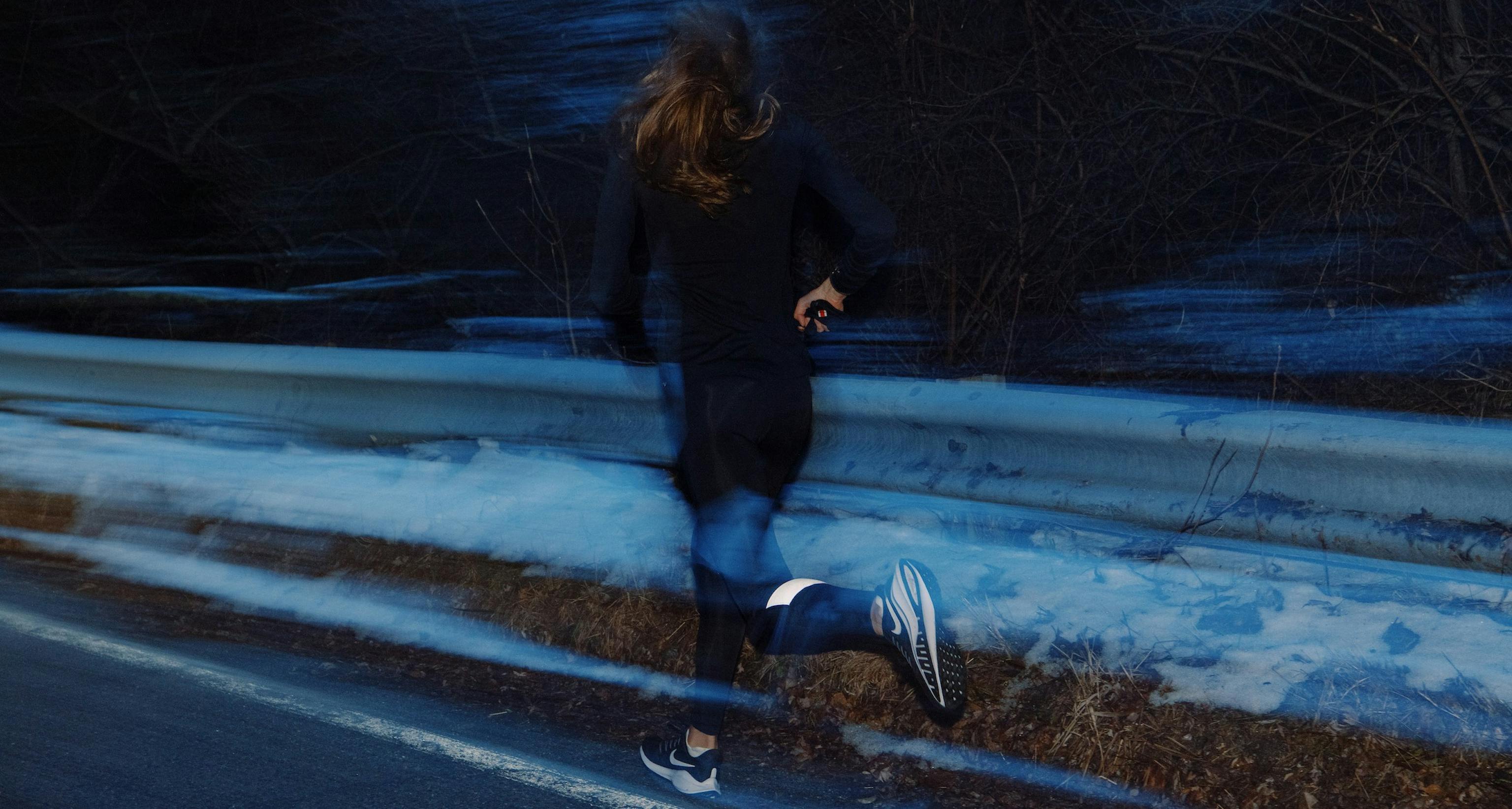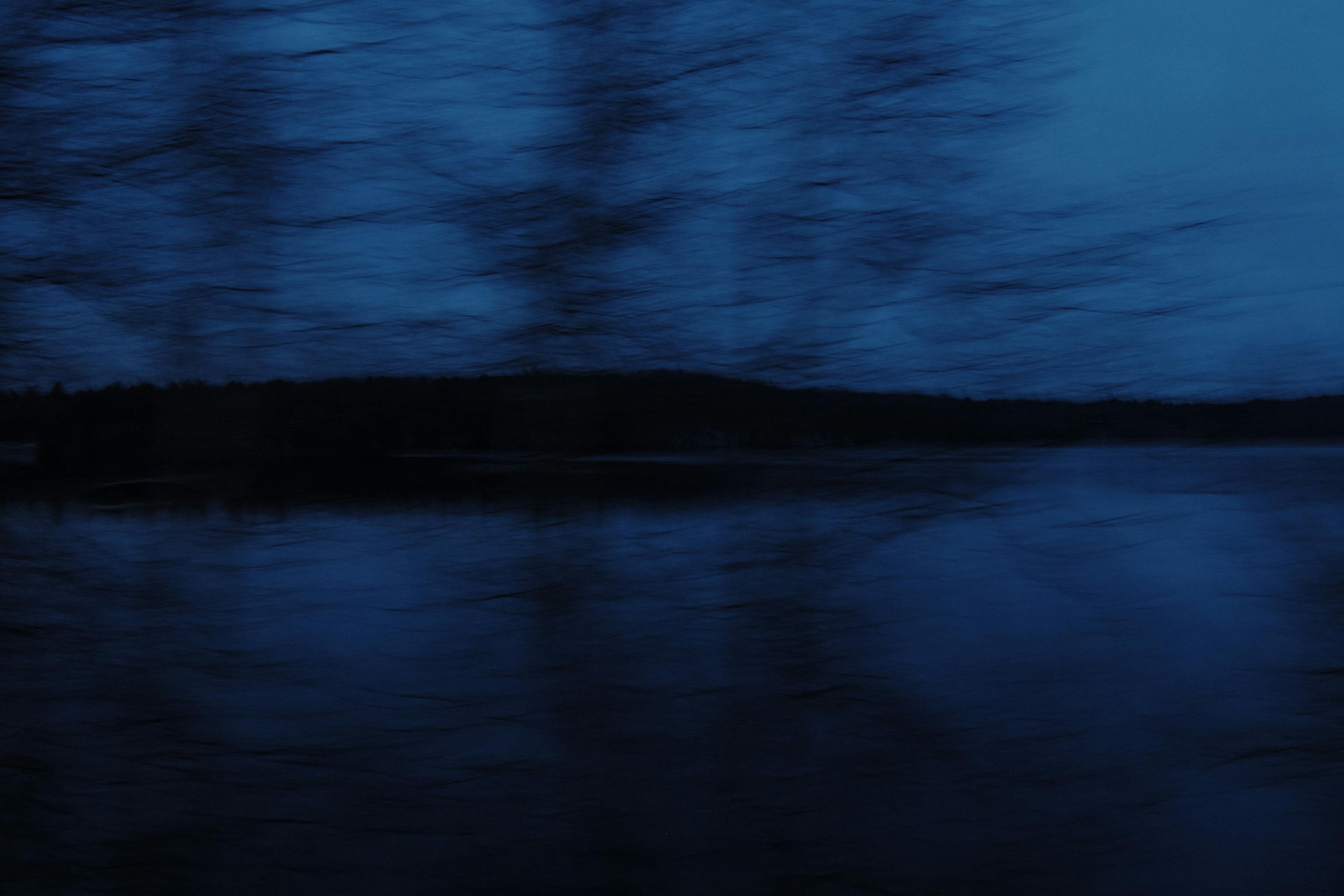

The Dark
Words by Lela Moore
Photography by Emily Maye
I used to run in the dark because I had to. Sometimes that meant mornings. I had to get myself ready for work and a child ready for school, I had to get us both out of the house and myself on the train and to the office. So I would run immediately after I woke up, before my son did, the moon sometimes lighting my path, other times strapping a headlamp over my hat. On days when I had to be at work before it was light out, I would run at night. If I did not wake up and run before anyone else was awake, or else have the opportunity to head out after everyone went to sleep, I would not run at all. This didn’t seem like a matter of toughness. It felt like a fact. In the winter, it is cold and the days are short.
If you run in the winter and early spring, most likely, you will run in the dark more than you will run in the light. Fact.
Then the pandemic came. I lost my job. My child stayed home from school for months. I lost track of time, but I didn’t lose track of running. I continued to log miles. Winter came again, the pandemic surged, I kept running. Now I ran in the dark simply because I encountered fewer people outside at those times. The fewer people I saw, the less likely I was to become sick.
But running in the dark in dark times does start to grate on you. It is easy to feel the frustration of Max, the subject of one of my favorite children’s stories, Max and the Tag-Along Moon by Floyd Cooper, who is told by his grandfather before a long nighttime drive to look for the moon, that the moon will always follow him, when the moon disappears briefly behind a cloud. We are deep in that cloud now.
It used to be that we would run in the dark, literally and metaphorically, with the promise of brighter things at the end. More sunshine, earlier sunrises and later sunsets, spring race start lines. PRs we would set because we put in those miles over the winter, two or three layers of wool and fleece, base layers and mid-layers and windproof shells, over every limb just to get out the door. Hats over headbands and mittens over gloves. And now, mask straps under or buffs atop the rest. But it helps when it’s not an option - and I’m not the only one who has worked up new coping mechanisms to keep me moving and maintain my routine.
“Changing the question to ‘when am I going to run?’ instead of ‘am I going to run?’ was key,” says Brienna Vos of New York, a member of my online running group. “It’s a matter of it’s now or never for me. I keep my shoes handy, my clothes are set out nightly, the coffee pot is set, breakfast is on repeat. Basically, it’s a matter of ‘don’t think, just go,’” says Kristy Powell of Champaign, Ill..
The Boston Marathon, traditionally the big spring race for serious runners, was indefinitely postponed for 2021. The London Marathon, typically held in April, was postponed until October. Around the country, race directors are keeping quiet about spring races, though many have seen the writing on the wall and are taking those events virtual or issuing cancellations.
Without a light at the end of this tunnel - yet, still - what gets us out the door in the dark, in the cold, and sometimes (often, depending on where you live) the dark and the cold? Over and over, for months of winter that seem long every year but especially this year? Floyd Cooper’s Max has to learn to trust that the moon is always there, even when he cannot see it. We runners must do the same.
Many runners find that stripping the run down to its essentials - you, your shoes, the elements - feels appropriately primal. “I feel like an animal on the pursuit,” says Kate Sanborn, a running-group friend from Raleigh, N.C. “Cold air just feels so much more like fresh air to me,” says Carla Benton of Chicago. “Magical” is a word many winter warriors in my running groups mentioned when discussing their runs in the dark.

“There's something magical about heading out in the dark and coming back in the light,” says Mimi Albert, of Palo Alto, Calif. “I'm not worrying about what has already happened that day. It's just me, working toward my goals in the morning with no distractions.” Yana Trinczek of Kamloops, British Columbia, Canada, another running-group pal, says that, although she appreciates running during the daylight more after training in the dark, “there is something super magical about getting out with the stars overhead and the quiet of the morning. Or when it has started snowing and it’s just your tracks and maybe a few deer.” “Winter running has always felt magical to me. I love feeling like I’m running in a snow globe during a storm,” says Katie Glennon of Maine.
The magic can carry its way off the road, too. “I love leaving when it's dark and coming back before dawn, it's like you get this extra special time to yourself before anyone else in the world is up. I often feel most accomplished on these mornings,” said Kelly Leighton of Harrisburg, Pa. “And the hot shower after is magical.”
Through the Covid crisis, like many runners, I’ve had to learn to see running less as a means to an end, and more as an essential act of self-care. As runners, we combat the dark days by making the run itself the light.
“I've been thrilled with no races to train for,” says Kimberly Clary Wood, of Apex, North Carolina. “There has been no anxiety to hit paces, no coach to report into. I'm free. There has not been a better year of running for me.”
The lack of races has freed up my body and mind to begin worrying less about miles and times and watches and apps. But by simply running, when the restrictions lift, I hope we can be together in the light again. “Since I'm not sure when COVID will allow racing to happen again, what's motivating me is building a strong base for when races do start,” says Shannon Bishop-Green, of Washington, D.C That’s a message that is echoed across the US and around the world.
As I run through the dark, early in the morning or late at night, these are the words I think as my feet hit the pavement. A mantra, if you will.
Run because your brain asks you to, not because your training plan tells you to, and because your mind is soothed by the rhythm of your feet on the pavement or on the trail. Run because after you do, your stress might not be gone, but it might be smoother, like a rock that’s been rolled around in a stream for a year or hundreds. Run because the cold and the dark are not just what we have to pass through to find the light, but because that tag-along moon, once the clouds reveal it, provides enough light on its own.